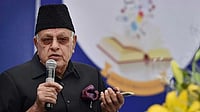The Dean of Diplomatic Corps, representing the foreign diplomats stationed in India, met the joint secretary in the ministry of external affairs on Friday to convey their concern on the grave air pollution in Delhi that is ravaging the health of many of its members.
The Ministry of External Affairs assured the 'concerned' Diplomatic Community that "Government of India is giving the matter of Delhi's deteriorating air quality top priority."
Distressed with Delhi's toxic air quality, and the laxity of the government in trying to curb the rising pollution levels, envoys have knocked on the doors of the Dean of Diplomatic Corps, Frank Hans Dannenberg Castellanos, to take up the issue with the Ministry of External Affairs.
Castellanos met Chief of Protocol in MEA, Sanjay Verma and conveyed the grievances of the envoys, and sought assurance that efforts are being made to bring down the air pollution.
Delhi's 'filthy' air forced Costa Rica Ambassador to India, Mariela Cruz Alvarez to move to Bengaluru after she developing respiratory illness in the city. She had called her stay here the 'worst experience of her life'.
"My experience of filthy air in Delhi is the worst experience I have ever had in my life. My lungs hurt, can't breathe well. Feverish and fatigued. This is no fun and 20 millions of people are breathing that poison now up north, including some dear friends. The basic right to clean air is a Human Right. The Indian government needs to make radical decisions here in India NOW. Leadership is about taking care of the people.That is #1 priority," Alvarez wrote in her blog.
As the smog enveloped the city, the central govt remained silent for most part of it, and only recently announcing the implementation of BS-VI emission fuel norms two years ahead of its schedule, in April 2018. And states like Haryana and Punjab traded barbs with Delhi government on Twitter.
It was mainly the National Green Tribunal, the Supreme Court-mandated green body EPCA and the Supreme Court itself that played the main role of smog-busters. They banned construction, shut down factories and industiral units, quadrapuled parking fees and banned entry of pollluting trucks into the city -- some of these measures now stand withdrwan following dip in pollution.
With the intervention of the Dean of Diplomatic Corps in the matter, the air pollution issue may gain more traction .
Last time the Dean met the MEA was over cash crunch caused by demonetisation. After the demonetisation of high denomination currency notes of Rs 500 and 1,000 last year, the government had placed a withdrawal cap of Rs 50,000 per week on business entities and foreign missions. Castellanos, representing ove 150 missions in India, wrote a letter complaining that the withdrawal ceiling was against the Vienna Convention, which seeks uninterrupted supply of facilities and resources to diplomatic missions. Soon after foreign secretary Jaishankar had met Castellanos.


























